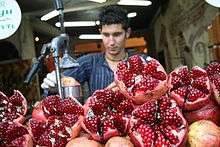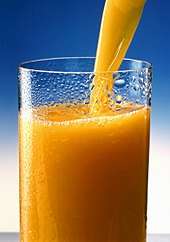Pomegranate juice
Pomegranate juice is made from the fruit of the pomegranate. It is used in cooking both as a fresh juice and as a concentrated syrup.
.jpg)

Possible health benefits and risks
Various primary studies have been conducted into possible health benefits derived from drinking pomegranate juice,[1] but there is no strong evidence to suggest any effect in blood pressure management,[2] cancer treatment,[3] glucose and insulin management,[4] or heart disease.[5] Any potential benefits also need to be balanced against its high caloric content derived from its natural sugars.
Marketing
The health benefits of pomegranate juice were promoted by POM Wonderful, a pomegranate products manufacturer. As of September 2010, the company and its principals were the subject of a false advertising complaint by the Federal Trade Commission (FTC).[6] In May 2012, after a hearing, the administrative law judge issued an opinion upholding certain false advertising allegations in the FTC’s complaint—based on implied as opposed to express claims—and finding for Pom Wonderful on other points.[7] Pom Wonderful's action in the U.S. District Court has been pending since May 23, 2012.[8]
Pomegranate molasses
Pomegranate molasses is a fruit syrup made from pomegranate juice, not sugarcane-derived molasses. It is a reduction from the juice of a tart variety of pomegranate, evaporated to form a thick, dark red liquid. It is used in Iranian fesenjān and Turkish dolma and various salads such as çoban salatası.[9] It is called رب انار (rob e ænar) in Persian , دبس رمّان (dibs rumman) in Arabic, nar ekşisi in Turkish, narşərab in Azerbaijani.
See also
References
- "Pomegranate: superfood or fad?". UK National Health Service (NHS). 2018-04-26.
- Gbinigie, OA; Onakpoya, IJ; Spencer, EA (Oct 2017). "Evidence for the effectiveness of pomegranate supplementation for blood pressure management is weak: A systematic review of randomized clinical trials". Nutrition Research. 46: 38–48. doi:10.1016/j.nutres.2017.07.007. PMID 29173650.
- Vlachojannis, Christian; Zimmerman, Benno F; Chrubasik-Hausmann, Sigmun (2015). "Efficacy and Safety of Pomegranate Medicinal Products for Cancer". Evidence-based Complementary and Alternative Medicine. 2015: 258598. doi:10.1155/2015/258598. PMC 4359844. PMID 25815026.
- Huang, Haohai; Liao, Dan; Chen, Guangzhao; Chen, Honglang; Zhu, Yongkung (2017). "Lack of efficacy of pomegranate supplementation for glucose management, insulin levels and sensitivity: evidence from a systematic review and meta-analysis". Nutrition Journal. 16 (67): 67. doi:10.1186/s12937-017-0290-1. PMC 5629805. PMID 28985741.
- "Pomegranate: superfood or fad?". UK National Health Service (NHS). 2018-04-26.
- Wyatt, Edward (September 27, 2010). "Regulators call health claims in Pom juice ads deceptive". The New York Times. Retrieved 6 February 2011.
- "US FTC Office of Administrative Law Judges Docket No. 9344 In the Matter of Pom Wonderful LLC and Roll Global LLC, et al Initial Decision dated May 17, 2012" (PDF). U.S. Federal Trade Commission Office of Administrative Law Judges. 2010-09-27. Retrieved 2012-05-29.
- Kardell, Nicole (May 24, 2012). "Why POM Wonderful Can Celebrate FTC Judge's Ruling in Advertising Case". The National Law Review. Retrieved 28 May 2012.
- Willoughby, John (March 23, 2010). "Making a foreign staple work back home". The New York Times. Retrieved 2010-03-25.
... pomegranate molasses. Made by boiling down the juice of a tart variety of pomegranate, this thick, dark brown, deeply flavorful liquid is also used in Turkish pilafs and, in southern Turkey, in the ubiquitous shepherd’s salad. In other Middle Eastern cuisines, it is most often found in soups and stews.
Further reading
| Wikimedia Commons has media related to Pomegranate juice. |
- Lovgren, Stefan. "Pomegranate Juice Fights Heart Disease, Study Says", National Geographic News, March 22, 2005. Accessed February 13, 2006
- Pomegranate - MedlinePlus (National Institutes of Health - Produced by the National Library of Medicine)
- M. Viuda-Martos, J. Fernández-López, and J.A. Pérez-Álvarez (2010) - “Pomegranate” (Comprehensive Reviews in Food Science and Food Safety)
- Books
- Levin, Gregory M. (2006). Pomegranate Roads: A Soviet Botanist’s Exile from Eden. Floreant Press. ISBN 978-0-9649497-6-8
- Seeram, N.P. / Schulman, R.N. / Heber, D. (eds. 2006). Pomegranates: Ancient Roots to Modern Medicine. CRC Press. ISBN 978-0-8493-9812-4
